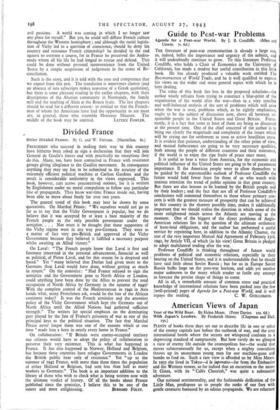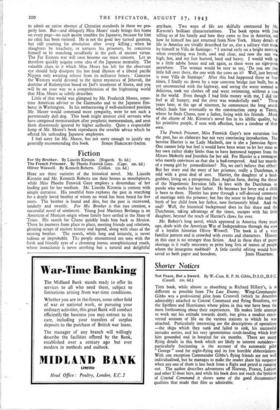American Views of Japan
Year of the Wild Boar. By Helen Mears. (Peter Davies. 12s. 6d.) With Japan's Leaders. By Frederick Moore. (Chapman and Hall. 158.)
PLENTY of books these days set out to describe life in one or other of the enemy capitals just before the outbreak of war, and the cosy international hotels where the secrets are whispered conform to depressing standard of sumptuosity. But how rarely do we glimpse a view of enemy life outside the cosmopolitan bar—the world that moves subterraneously for us, except when a mighty convulsion throws up its anonymous young men for our machine-guns and bombs to feed on. Such a rare view is afforded us by Miss Mears. In 1935 she lived in Tokyo—a la fraponaise—far from the Embassies and the Western veneer, so far indeed that an excursion to the neon- lit Ginza, with its "Cafés Cheerioh," was quite a substantial adventure.
Our national sentimentality, and the fashionable deification of the Little Man, predispose us to people the ranks of our foes with gentle creatures bemused by an odious propaganda. We are reluctant to admit an entire absence of Christian standards in those we pro- perly hate. But—and obliquely Miss Mears' study brings this home on every page—no such qualm troubles the Japanese, because for him no ethic has been violated. He is not the good boy turned gunman, but still yearning for absolution after every killing ; when he slaughters by treachery, or tortures his prisoners, he conceives himself -to be marching steadfastly in the path of ancient virtue. The Far Eastern war will soon become our main concern. Let us therefore quickly acquire some idea of the Japanese mentality. The valuable clues to it which Miss Mears has left for the observant eye should help dissipate the last fond illusion of a liberal pacific Nippon only awaiting release from its militarist fetters. ' Conceive the Western world devoted, to the fierce mysteries of Jehovah, the doctrine of Redemption based on Jael's treatment of Sisera, and you will be on your way to a comprehension of the frightening world that Miss Mears so subtly describes.
Little of that world was glimpsed by Mr. Frederick Moore, some- time American adviser to the Gaimusho and to the Japanese Em- bassy in Washington. In his embarrassing if well-cushioned position Mr. Moore would command more sympathy, were he not such a portentously dull dog. This book might interest civil servants who have composed memorandum after prophetic memorandum, and seen them disastrously ignored by higher authority. Quite a respectable lump of Mr. Moore's book reproduces the sensible advice which he offered his unheeding Japanese employers.
I feel sorry for Mr. Moore, but not sorry enough to justify my
generally recommending this book. SIMON HARCOURT-SMITH.























 Previous page
Previous page